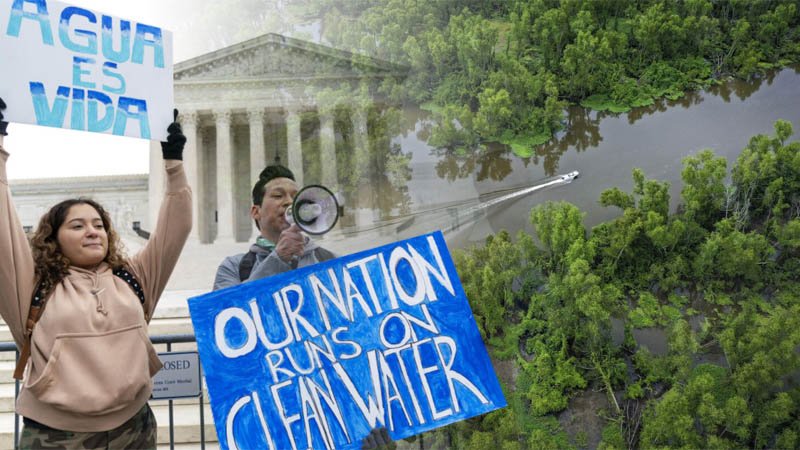The court’s majority argued that the Clean Water Act only applies to wetlands that have a “significant nexus” to traditional navigable waterways.

The US Supreme Court on Thursday ruled that the government cannot regulate wetlands that are not connected to traditional navigable waterways, in a decision that environmental groups say will harm water quality and wildlife. The 5-4 decision, written by Justice Clarence Thomas, overturns a 2020 lower court ruling that had upheld the government’s authority to regulate wetlands under the Clean Water Act.
The court’s majority argued that the Clean Water Act only applies to wetlands that have a “significant nexus” to traditional navigable waterways.
Environmental groups say the decision of Clean Water Act will make it easier for developers to destroy wetlands, which play a vital role in filtering water, storing carbon, and providing habitat for wildlife.
“This is a devastating decision for our nation’s wetlands,” said Emily Wurth, director of the Natural Resources Defense Council’s Clean Water Project. “The Supreme Court has turned a blind eye to the science and the law, and has opened the door to the destruction of millions of acres of wetlands.”
The decision is the latest in a series of rulings by the Supreme Court that have rolled back environmental protections. In 2020, the court struck down a key provision of the Clean Air Act, and in 2019, it weakened the Endangered Species Act.
Environmental groups say the Supreme Court’s latest decision is a sign that the court is hostile to environmental protection.
“This is a clear signal that the Supreme Court is willing to roll back environmental protections at every turn,” said Wurth. “We need to fight back to protect our air, water, and wildlife.”
The implications of SC ruling
The implications of the US Supreme Court ruling over wetlands are far-reaching and could have a significant impact on the environment. The ruling, which was issued on May 25, 2023, limits the federal government’s authority to regulate wetlands, which are areas of land that are periodically inundated with water.
The ruling is a victory for developers and landowners who have long sought to reduce the federal government’s oversight of wetlands. However, environmental groups say the ruling will harm water quality, wildlife, and flood control.
Wetlands play a vital role in the environment. They filter pollutants from water, store carbon, and provide habitat for wildlife. They also help to prevent flooding by absorbing excess water.
The Supreme Court’s ruling will make it easier for developers to fill in wetlands, which could lead to increased pollution, flooding, and loss of wildlife habitat. The ruling is also a setback for efforts to combat climate change, as wetlands play an important role in storing carbon.
Environmental groups are vowing to fight the Supreme Court’s ruling. They are considering legal challenges and lobbying Congress to pass legislation that would restore the federal government’s authority to regulate wetlands.
The implications of the Supreme Court’s ruling are still being debated. However, it is clear that the ruling will have a significant impact on the environment. Since the wetlands filter pollutants from water, so their destruction could lead to increased pollution in rivers, lakes, and streams.
Wetlands help to prevent flooding by absorbing excess water. Their destruction could lead to more flooding in areas that are prone to flooding. Wetlands also provide habitat for a wide variety of wildlife, including fish, birds, and amphibians. Their destruction could lead to the loss of wildlife habitat.
The destruction of wetlands is a major setback for climate change efforts. Wetlands store large amounts of carbon, and when they are destroyed, this carbon is released back into the atmosphere. This contributes to climate change and makes it more difficult to mitigate the effects of global warming.
In addition, wetlands help to protect communities from flooding. They absorb excess water during storms and floods, which can help to prevent property damage and loss of life. The destruction of wetlands can make communities more vulnerable to flooding, which is a major threat to public safety.
Reaction of builders over SC ruling
Builders in the United States have generally welcomed the US Supreme Court ruling on wetlands, which limits the federal government’s authority to regulate wetlands. The ruling is seen as a victory for builders who have long sought to reduce the federal government’s oversight of wetlands.
The National Association of Home Builders (NAHB) praised the ruling, saying it “will help to reduce regulatory uncertainty and create jobs.” The NAHB also said the ruling would “help to ensure that our nation’s wetlands are protected in a way that is balanced with the need for economic development.”
The American Society of Civil Engineers (ASCE) also welcomed the ruling, saying it “is a step in the right direction.” The ASCE said the ruling “will help to reduce the cost of development and make it easier to build affordable housing.”
However, environmental groups have criticized the ruling, saying it will harm water quality, wildlife, and flood control. The Natural Resources Defense Council (NRDC) said the ruling “is a major setback for our nation’s wetlands.” The NRDC also said the ruling “will make it easier for developers to destroy wetlands, which will harm water quality, wildlife, and flood control.”
The implications of the ruling are still being debated. However, it is clear that the ruling will have a significant impact on the environment and on the development of wetlands. The Supreme Court’s decision is a major setback for wetlands protection.
Wetlands are essential to the health of our environment, and the court’s decision will make it easier for developers to destroy them. We need to take action to protect our wetlands and ensure that they are protected from harm.